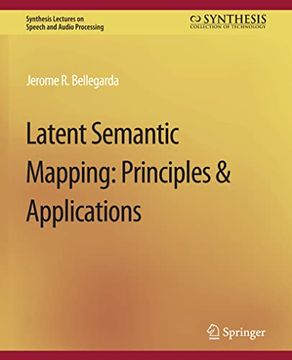Share
Latent Semantic Mapping: Principles and Applications
Jerome R. Bellegarda
(Author)
·
Springer
· Paperback
Latent Semantic Mapping: Principles and Applications - Bellegarda, Jerome R.
£ 35.99
£ 39.99
You save: £ 4.00
Choose the list to add your product or create one New List
✓ Product added successfully to the Wishlist.
Go to My WishlistsIt will be shipped from our warehouse between
Friday, May 31 and
Wednesday, June 05.
You will receive it anywhere in United Kingdom between 1 and 3 business days after shipment.
Synopsis "Latent Semantic Mapping: Principles and Applications"
Latent semantic mapping (LSM) is a generalization of latent semantic analysis (LSA), a paradigm originally developed to capture hidden word patterns in a text document corpus. In information retrieval, LSA enables retrieval on the basis of conceptual content, instead of merely matching words between queries and documents. It operates under the assumption that there is some latent semantic structure in the data, which is partially obscured by the randomness of word choice with respect to retrieval. Algebraic and/or statistical techniques are brought to bear to estimate this structure and get rid of the obscuring ""noise."" This results in a parsimonious continuous parameter description of words and documents, which then replaces the original parameterization in indexing and retrieval. This approach exhibits three main characteristics: -Discrete entities (words and documents) are mapped onto a continuous vector space; -This mapping is determined by global correlation patterns; and -Dimensionality reduction is an integral part of the process. Such fairly generic properties are advantageous in a variety of different contexts, which motivates a broader interpretation of the underlying paradigm. The outcome (LSM) is a data-driven framework for modeling meaningful global relationships implicit in large volumes of (not necessarily textual) data. This monograph gives a general overview of the framework, and underscores the multifaceted benefits it can bring to a number of problems in natural language understanding and spoken language processing. It concludes with a discussion of the inherent tradeoffs associated with the approach, and some perspectives on its general applicability to data-driven information extraction. Contents: I. Principles / Introduction / Latent Semantic Mapping / LSM Feature Space / Computational Effort / Probabilistic Extensions / II. Applications/ Junk E-mail Filtering / Semantic Classification / Language Modeling / Pronunciation Modeling / Speaker Verification / TTS Unit Selection / III. Perspectives / Discussion / Conclusion / Bibliography
- 0% (0)
- 0% (0)
- 0% (0)
- 0% (0)
- 0% (0)
All books in our catalog are Original.
The book is written in English.
The binding of this edition is Paperback.
✓ Producto agregado correctamente al carro, Ir a Pagar.

